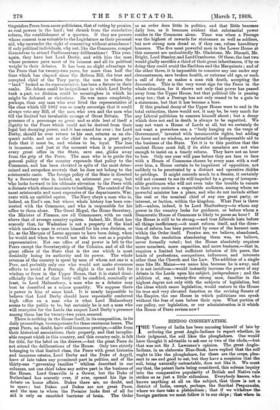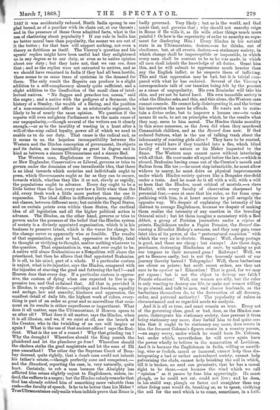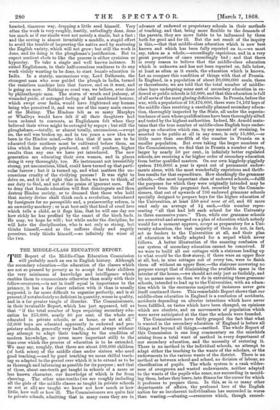HINDOO CONSERVATISM. 1857 it was accidentally reduced, North India sprang
in one glad bound, as of a panther with its chain cut, at our throats ; and in the presence of those three admitted facts, what is the use of chattering about popularity ? If our rule in India has no better moral base than popularity, the sooner we are out of it the better ; for that base will support nothing, not even a theory as fictitious as itself. The Viceroy's question and his agents' replies might have been useful had they enlightened us in any degree as to our duty, or even as to native opinion about our duty ; but they have not, that we can see, done that ; and as the replies were not entrusted to natives, and as we should have remained in India if they had all been hostile, there seems to us some trace of cynicism in the demand for them. The only result the Reports can produce is a slight addition to a self-complacency already quite sufficient, and a slight addition to the disaffection of the small class of intel- lectual natives. "No floggee and preachee too, massa," said the negro ; and a native with the pedigree of a Seymour, the history of a Stanley, the wealth of a Baring, and the position of a non-commissioned officer in an aristocratic regiment, is likely to be of nearly the same opinion. We question if the reports will even enlighten Parliament as to the main cause of our unpopularity,—though several of the writers see it clearly enough,—or as to the inutility of wasting in a hunt after a will-of-the-wisp called loyalty, power all of which we need to enable us to do our duty. That cause is the radical and, as it seems to us, the hopeless incompatibility between the Western and the Hindoo conception of government, its objects and its duties, an incompatibility as great in degree and in kind as between a sincere Ultramontane and a sincere Red.
The Western man, Englishman or German, Frenchman or New Englander, Conservative or Liberal, governs or tries to govern under the dominion of one ineradicable idea, that there is an ideal towards which societies and individuals ought to press, which Governments ought as far as they can to secure, towards which, whether they like it or not, slowly or rapidly, the populations ought to advance. Every day ought to be a little better than the last, every new law a little wiser than the old, every fresh work a little more perfect than the one it supersedes. The ideal differs in different places, among differ- ent classes, between different men; but outside the Papal States, and on certain points even within those States, the cardinal idea of all legislation and all the higher political action is advance. The Hindoo, on the other hand, governs or tries to govern under the pressure of the belief that the Hindoo system of society is a divinely appointed organization, which it is his business to preserve intact, which is the worse for change, be the change never so apparently wise or feasible. The results of that organization, good or bad, oppressive or kindly, fatal to thought or vivifying to thought, matter nothing whatever to the question. That organization is, was, and ever ought to be. A native will abuse Brahminism as a Neapolitan will abuse the priesthood, but then he allows that God appointed Brahmins. It is all, to his mind, part of a whole. If a particular custom is unjust, what is its injustice, says the Hindoo, compared with the injustice of starving the good and fattening the bad ?—and Heaven does that every day. If a particular custom is oppres- sive, the custom of dying when one expected to live is op- pressive too, and God ordained that. All that is, provided it is Hindoo, is equally divine,—privilege and freedom, equality and serfage, law and anarchy, kiudness and oppression, the smallest detail of daily life, the highest work of rulers, every- thing is part of an order so great and so marvellous that com- ment on its results is either superfluous or impertinent. What does it -all matter, says the Ultramontane, if Heaven opens to us after all ? What does it all matter, says the Hindoo, when it is all illusion, and we, if we exist at all, are the breath of the Creator, who in the twinkling of an eye will inspire us again ? What is the use of that ancient officer? says the Resi- dent. What is the use of a comet ? Why that grinding tax ? Why the drought? Wherefore should the King punish the plundered and let the plunderer go free ? Wherefore should the cholera strike the good magistrate and let the sons of Eli pass unscathed ? The other day the Supreme Court of Born- bay decreed, quite rightly, that a dumb man could not inherit his father's estate,—though perfectly sane and competent,— and the Standard, reporting the case, is, very naturally, quite hurt. Certainly, to rob a man because the Almighty has afflicted him seems slightly unjust to Englishmen, unless, in- deed,the sufferer is a negyo ; but the Hindoo calmly remarks that God has already robbed him of something more valuable than cash---the faculty of speech. Is he to be better than his Maker ? True Ultramontanes only smile when infidels prove that Rome is
badly governed. Very likely ; but so is the world, and God made that, and governs that ; why should not anarchy reign in Rome if He wills it, as He wills other things much more painful ? Or how is the superiority of order to anarchy an argu- ment for disobeying Him ? Every Hindoo in his natural' state is an Ultramontane, desires,—as he thinks, out of obedience, but, at all events, desires,—a stationary society, in which change shall be imperceptible or impossible, in which every man shall be content to be as he was made, in which all men shall inherit the knowledge of all duties. Grant him this, and he will submit to oppressions much heavier than any the English inflict, or he suspects them of inflicting. This and that oppression may be bad, but it is trivial com- pared with what he has endured. Several of the Viceroy's correspondents talk of our taxation being felt by the peasant as a cause of unpopularity. His own Zemindar will take his skin, and yet not be hated hard. His own immobile society is what the Hindoo asks, and this, and this alone, the Western man- cannot concede. He cannot help disintegrating it, and the better his innovation the more he offends. He wants not to main- tain a divine order, but to improve a human one—to make means fit ends, to act on principles which, be the results what they may, seem to him moral. The Hindoo thinks morality in this sense nonsense, as the Jews did when they murdered Canaa,nitish children, and as the Record does now. If God ordered Suttees, what is the use of talking trash about the inhumanity of roasting girls alive ? They have to be roasted, as they would have if they tumbled into a fire, which blind faculty of torture nature or its Maker imparted to the flame. The Western man cannot move without interfering with all that. He must make all equal before the law,—which is absurd, Brahmins having come out of the Creator's mouth and Sudras from His toe ;—he must stop infanticide, he must allow- widows to marry, he must drive on physical improvements under which Hindoo society quivers like a Bengalee rice-field under a train. And he must do it all with a will, with a will so keen that the Hindoo, most critical of mortals,—a slave Hazlitt, with every faculty of observation sharpened by perennial fear,—sees at once that his ruler, so far from sym- pathizing with him, is at heart anxious to pull savagely the opposite way. We despair of explaining the intensity of his distrust to average Englishmen, because we despair of making them realize the intensity of any emotion in the brooding Oriental mind ; but let them imagine a monastery with a Red Abbot, a group of Parisian journalists under a re'gime of priests, Englishmen under a Papist Premier, the Record dis- cussing a Ritualist Bishop's sermons, and they may gain some faint idea of its power, of the "preternatural suspicion" with which the very air is electric. Stamps ! Well, cheap postage is good, and these are cheap ; but stamps I Are these dogs, perchance, destroying Hindooism at once, by making us put our tongues to their accursed gum ? Railways ! Well, we get to Benares easily, but is not the heavenly merit of our journey thereby barred ? Telegraphs! Well, these barbarians are clever on points ; but swift secret orders, are they not sure to be against us ? Education ! That is good, for we may get rupees ; but is not the object to destroy our faith ? Female education Well, our women are silly, but the ruler is only wanting to destroy our life, to make our women willing to go abroad, and talk to men, and choose husbands, as the barbarians themselves do, to the destruction of all decency, order, and paternal authority ! The popularity of rulers so circumstanced and so regarded needs no analysis.
And it is all so true, and must remain so true. Every act of the governing class, good or bad, does, as the Hindoo sus- pects, disintegrate his stationary society, does prevent it from being stationary any more, does forbid him to feel quite cer- tain that it ought to be stationary any more, does create in him the ferment Colenso's figures create in a country parson, —an angry worry, under which he would burn Dr. Colenso, but under which, nevertheless, he will never again have the power wholly to believe in the numeration of Leviticus. And it is because the Englishman in India, willing or unwill- ing, wise or foolish, moral or immoral, cannot help thus dis- integrating a bad or rather undeveloped society, cannot help pulverizing the clods, cannot help breaking the soil in which, till it is broken, no seed can germinate, that he has a moral right to be there,—not because the wind which we call " opinion " as it passes by fans him approvingly. He must' plough, or he could not eat, could not live ; and he does, in his stolid way, plough on faster. and straighter than any other living_man would do, breaking or, so to speak, vivifying the soil for the seed which is to come, sometimes, in a half- hearted, timorous way, dropping a little seed himself. Very often the work is very roughly, hastily, unfeelingly done, done too much as if our simile were not merely a simile, but a fact ; and the sowing is almost invariably a muddle, a stupid effort to avoid the trouble of improving the native seed by scattering the English variety, which will not grow; but still the work is done, and its doing is the ploughman's justification. But to expect sentient clods to like the process is either cynicism or hypocrisy. To take a single and well known instance. It suited Englishmen, in their half-conscious readiness to do any work visibly wanting to be done, to start female education in India. In a stately, unconscious way, Lord Dalhousie, the strongest man who ever guided the plough in India, turned the resistless machine into that furrow, and on it went, and is going on now. Nothing so cruel was, we believe, ever done by philanthropic man. The storm of wrath and jealousy, of wounded pride, of outraged feeling, of half maddened honour, which swept over India, would have frightened any human being who perceived it, and was one of the many main causes of the Mutiny. The Hindoos felt as so many Murphys or Whalleys would have felt if all their daughters had been ordered to convents, as Englishmen felt when they believed their wives might be outraged by sepoys ; but still the ploughshare,—totally, or almost totally, unconscious,—swept on, the soil was broken up, and in ten years a new idea was born in the Hindoo mind,—the idea that if men are to be educated their mothers must be cultivated before them, an idea which has already produced, and will produce, higher results than any one we have yet introduced. The new generation are educating their own women, and in places doing it very thoroughly, too. No instrument not irresistibly strong, yet unconscious, blind, could have turned up that parti- cular furrow ; but it is turned up, and what matters the un- conscious cruelty of the vivifying process ? It was right to drive on, and it is of right that in India we have to think, of our duty to God, and not of the praise of ignorant men. But to deny that female education will first disintegrate and then destroy Hindoo society, or to demand that those who hold that society divine shall think such a revolution, introduced by foreigners for no perceptible end, a praiseworthy reform, is an unworthy mockery; or is at best only that kind of cruel love which tells a child, as it flogs him, that he will one day see how richly he has profited by the smart of the birch buds. He may, we hope he will ; but while under the discipline, he will hate the disciplinarian, who is not only so strong, but thinks himself, —and as the sufferer dimly and angrily perceives, truly thinks himself, —so infinitely the wiser of the two.




































 Previous page
Previous page